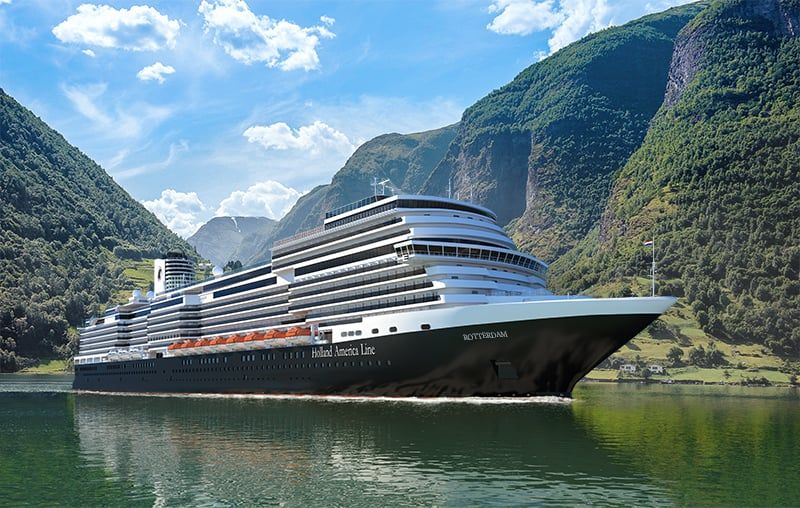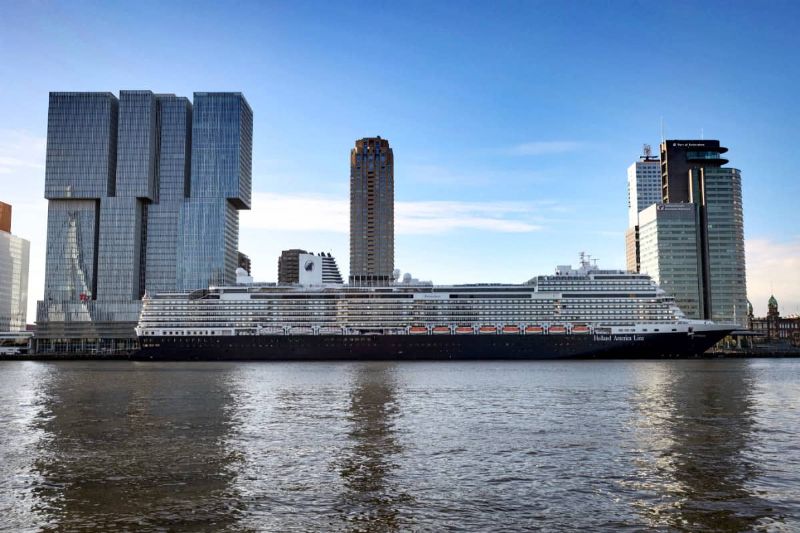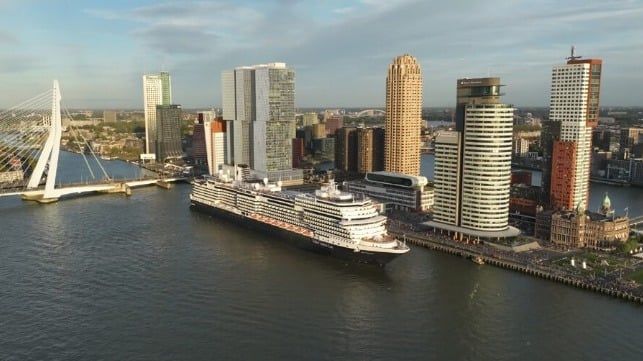
Holland America Line’s flagship cruise ship, Rotterdam (99,935 gross tons) started a long-term test using 100 percent low carbon intensity biofuel while cruising the Norwegian fjord this season. It marks the next advancement in a series of tests by Carnival Corporation using cruise ships from Holland America and AIDA and moving from biofuel blends to 100 percent certified biofuel mirroring similar tests in other parts of the commercial maritime industry.
The cruise ship bunkered with the biofuel derived from feedstocks by GoodFuels and supplied by FincoEneries before leaving the Port of Rotterdam in the Netherlands on April 27. Built by Fincantieri and delivered on July 30, 2021, she is the newest ship operated by the line and one of the newest in the industry. Past experience has confirmed that the Holland America cruise ship can operate on biofuels without modifications to the engine or the fuel structure.
During the initial phase of this test, the Rotterdam will operate one of her four engines during cruises this month using the biofuel which is expected to yield an estimated 86 percent reduction in life-cycle greenhouse gas emissions. The fuel will be used while cruising in Norway’s fjords including Geirangerfjord and Naeroyfjord. The cruise line said there is a potential to expand to multiple engines during the summer as the test progresses.
Carnival Corporation began its tests with biofuels in 2022. AIDA Cruises tested the use of regenerated biofuels in marine diesel engines together with research partners at the University of Rostock. Based on those tests, the cruise line proceeded to bunker a biofuel blend on July 21, 2022, aboard the AIDAPrima ( 125,572 gross tons), becoming the first larger-scale cruise ship to take on a blend of marine biofuel. Tests were conducted while the ship was cruising in Northern Europe between Rotterdam, Hamburg, and Norway.
The cruise ship entered service in 2016 and was one of the first two cruise ships outfitted with dual-fuel engines that could also burn LNG supplied by trucks while alongside in the port. The AIDAPrima loaded a second delivery of biofuel in December 2022 receiving that time 140 metric tons of 100 percent biofuel.
Holland America also conducted the first sustained trial of biofuel aboard its cruise ship Volendam (61,214 gross tons) in August and September 2022 while the vessel was docked in Rotterdam on a temporary charter to house Ukrainian refugees. For the first five days of that test, they used a 70-30 mix of biofuel and marine gas oil in one of the ship’s main auxiliary engines. For the next 15 days, they used 100 percent sustainable biofuel. They reported achieving a minimum 78 percent decrease in lifecycle CO2 emissions compared to marine gas oil emissions.
The cruise sector is catching up to other parts of the commercial shipping industry that have also tested biofuels. Royal Caribbean Group also began tests in 2022 and in the summer of 2023 tested sustainable biofuel blends on Royal Caribbean International’s Symphony of the Seas (228,000 gross tons) sailing from Barcelona and Celebrity Cruises’ Celebrity Apex (129,500 gross tons) sailing from Rotterdam. The company completed 12 consecutive weeks of biofuel testing in Europe calling it a “pivotal moment for Royal Caribbean Group’s alternative fuel journey.”
The tests of biofuels have been successful. The broad shipping industry however reports it is limited by the availability of biofuel.



We use cookies to improve your experience. By continuing to use our site, you accept our Cookies, Privacy Policy,Terms and Conditions. Close X